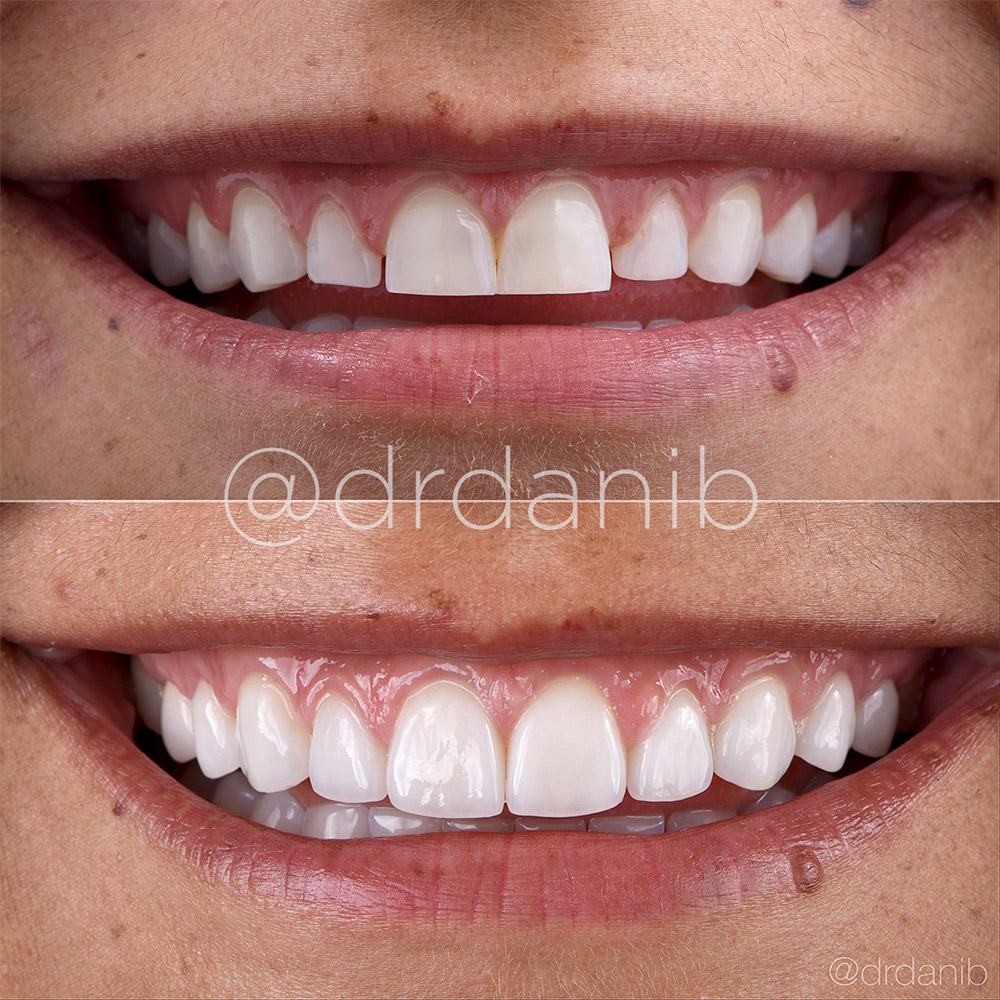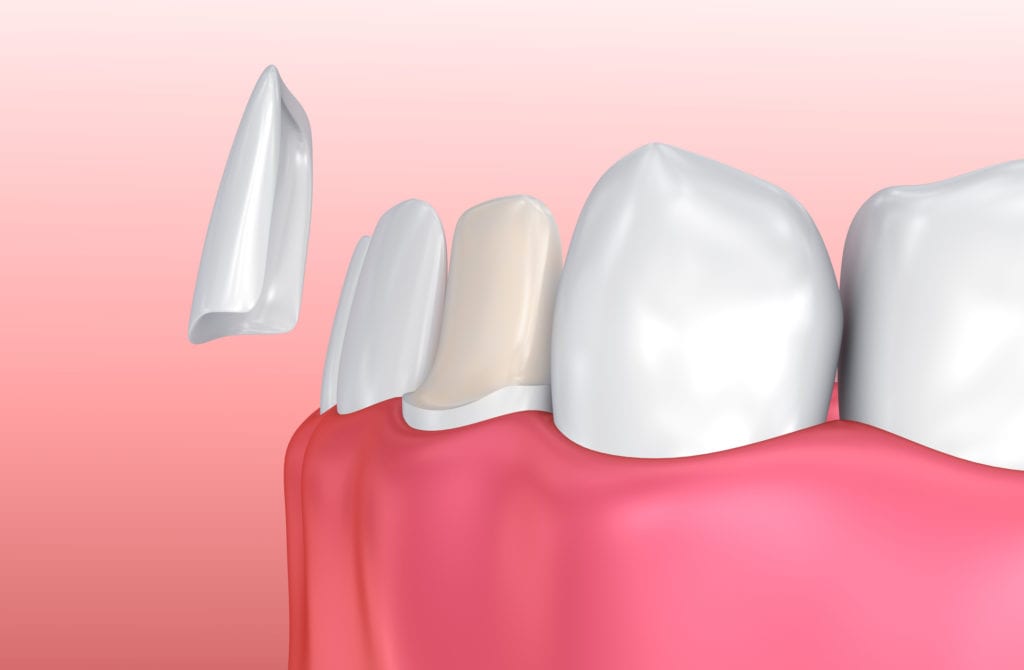Porcelain Veneers Dentist Explains the Complete Procedure
Unlocking the Tricks of Veneers: Realities, Kinds, and Benefits for an Attractive Smile
Veneers supply a compelling service for those seeking to boost their smiles. These oral enhancements can resolve different flaws, from discoloration to imbalance. With choices like porcelain and composite, people can choose based on their preferences and needs. Nonetheless, recognizing the subtleties of veneers, consisting of application and care, is essential. What factors should one consider prior to making a choice? The answers may stun those curious about this visual oral alternative.

Recognizing Veneers: What Are They?
Veneers are slim, tailor-made shells created to cover the front surface of teeth, enhancing their look. Generally crafted from long lasting products, these shells are tailored to fit each person's teeth specifically. They serve numerous objectives, including correcting aesthetic flaws such as staining, chips, or voids. The application procedure involves a dental practitioner preparing the teeth, typically by eliminating a tiny amount of enamel to ensure a tight fit. Once prepared, the veneers are bonded to the teeth using a strong adhesive.
Patients frequently pick veneers for their capacity to develop a natural-looking smile while supplying a lasting remedy to oral blemishes. Unlike various other aesthetic dentistry choices, veneers call for marginal intrusive procedures, making them a popular choice. The result is a better smile that can substantially boost a person's confidence and self-esteem. Generally, veneers provide an efficient method to achieving an extra appealing and unified oral appearance.
Sorts of Veneers: Porcelain vs. Compound
When thinking about aesthetic dental choices, 2 primary types of veneers stand out: porcelain and compound. Porcelain veneers are crafted from a sturdy ceramic material that mimics the natural look of teeth. They are recognized for their stain resistance and capacity to reflect light likewise to natural enamel, providing an aesthetic allure that lots of individuals need. The application procedure generally includes more preparation of the tooth structure and may call for numerous visits to the dental expert.
On the various other hand, composite veneers are made from a tooth-colored material that is straight related to the teeth. This type enables quicker application and can often be finished in a single see. While they are cheaper than porcelain veneers, they may not use the same durability or resistance to staining. Ultimately, the option in between porcelain and composite veneers depends upon specific preferences, budget, and particular oral requirements.
The Advantages of Finding Veneers
Selecting veneers supplies countless advantages that can significantly enhance both the aesthetics and performance of an individual's smile. One of the primary benefits is their capability to remedy blemishes such as staining, voids, and imbalance, resulting in a more uniform look. Veneers can also boost the sturdiness of teeth, providing a safety layer that shields them from damage.
Additionally, they need very little tooth prep work contrasted to other oral procedures, preserving more of the natural tooth framework. This conservation adds to a healthier oral environment while still accomplishing a stunning smile.
Veneers are highly customizable, permitting individuals to pick the form, size, and shade that finest suits their preferences. In addition, they are stain-resistant, making it much easier to maintain a attractive and intense smile with time. On the whole, veneers provide a reliable option for those looking for both aesthetic enhancement and long-term dental wellness benefits.
The Veneer Application Refine
The veneer application process includes several essential actions to ensure ideal results. An appointment is conducted to assess the person's requirements, adhered to by the preparation and shaping of the teeth. The veneers are bonded in place, with modifications made for a perfect fit and look.
Initial Consultation Steps
An extensive first appointment is vital for any person thinking about veneers, as it sets the structure for a successful treatment. During this conference, the oral expert examines the person's oral health and wellness, talking about any existing problems that can influence the veneer application. This analysis may include X-rays and an aesthetic examination to determine the condition of the teeth and gums.
The dental practitioner additionally involves the individual in an in-depth discussion about their aesthetic goals, choices, and assumptions. They may provide different veneer alternatives customized to the person's specific demands. In addition, the specialist clarifies the treatment, possible risks, and aftercare demands, making sure that the person is knowledgeable and comfortable before waging the therapy.
Prep Work and Forming Teeth
After the preliminary examination, the following stage involves the preparation and shaping of the teeth to fit the veneers. This essential action is performed by the dentist, that very carefully assesses the tooth framework to figure out the amount of enamel that requires to be gotten rid of. Typically, a slim layer, normally around 0.5 millimeters, is slashed off to assure an appropriate fit for the veneers. Accuracy is critical throughout this process, as it impacts both the general convenience and the visual result. Once the teeth are properly formed, impressions are taken to create customized veneers that straighten perfectly with the individual's dental profile. This careful prep work sets the stage for an effective veneer application, improving both look and function.
Bonding and Final Changes
Complying with the shaping and preparation of the teeth, the bonding procedure starts, marking a crucial phase in the veneer application. Throughout this stage, a dental adhesive is used to the ready tooth surface area, assuring a solid bond between the veneer and the tooth. The dental practitioner diligently positions the veneer, making adjustments to attain the preferred placement and aesthetics. When correctly put, an unique light is utilized to treat the glue, strengthening the bond. After treating, the dentist performs final adjustments, cutting any kind of excess product and refining the veneer's form to ensure an all-natural look. This cautious interest to information boosts both feature and aesthetic appeals, adding to an overall gorgeous smile that is long-lasting and sturdy.
Taking care of Your Veneers: Maintenance Tips
Caring for veneers is vital to preserve their appearance and longevity. A regular day-to-day cleaning regimen, mindful evasion of discoloring foods, and routine oral check-ups are key parts of efficient maintenance. These methods help assure that veneers continue to be in peak condition and remain to boost one's smile.
Daily Cleaning Regimen
Regularly preserving veneers is important for their durability and appearance. An appropriate daily cleaning routine can assist preserve their luster and avoid damage. Dental experts advise brushing twice a day with a soft-bristled tooth brush and fluoride toothpaste, guaranteeing that all surface areas are cleaned up delicately to avoid scraping the veneer surface. Flossing daily is additionally vital to eliminate food bits and plaque from between teeth, where brushes might not get to. In addition, using an antimicrobial mouthwash can assist preserve oral health without hurting the veneers. It is recommended to avoid unpleasant cleaners and tools that can scratch the veneer. By following these basic actions, individuals can maintain their veneers looking beautiful while promoting total dental health and wellness.
Staying Clear Of Staining Foods
Veneers are designed to boost the look of teeth, their susceptibility to tarnishing requires cautious nutritional choices. It is official statement vital for people with veneers to be conscious of specific foods and beverages that can result in staining. Dark-colored products such as coffee, red wine, and berry juices must be eaten in moderation, as they are known to discolor both natural teeth and veneers. Furthermore, acidic foods like citrus fruits can damage the bonding agents made use of in veneers, making them extra prone to staining. To preserve an intense smile, it is suggested to wash the mouth with water after eating staining foods and to practice regular dental health. These thoughtful options contribute substantially to the longevity and aesthetic appeals of veneers.

Regular Dental Exams

Keeping the integrity of veneers calls for a commitment to normal oral check-ups, as these consultations play a vital role in guaranteeing their durability and look. Throughout these brows through, dental professionals can examine the condition of the veneers, looking for any type of indicators of wear, damage, or underlying dental concerns. Furthermore, routine cleanings aid get rid of plaque and tartar that can accumulate around the veneers, promoting overall oral health and wellness. Dentists can likewise offer tailored guidance on treatment techniques and items suited for veneer maintenance. By sticking to a routine of exams, individuals can resolve prospective issues early, ensuring their smile stays attractive and vivid. Eventually, routine dental check outs are a critical component of veneer care.
Is Veneers the Right Alternative for You?
Determining whether veneers are the right option commonly rests on private aesthetic important link goals and dental demands. For those looking for to attend to issues such as staining, chips, or misalignment, veneers can supply a transformative service. Prospects commonly consist of individuals with healthy and balanced teeth but want a boosted smile.
It is vital to take into account variables such as tooth enamel condition, the degree of dental concerns, and the readiness to keep veneers. Consulting with an oral specialist is essential, as they can assess oral wellness and determine if veneers appropriate
Furthermore, prospective candidates need to mirror on the long-lasting commitment, as veneers may need replacement every 10-15 years. Expense factors to consider also play a substantial role, as veneers can be a considerable investment. Ultimately, the decision needs to be well-informed, stabilizing visual desires with sensible factors to consider for enduring results.
Regularly Asked Concerns
The Length Of Time Do Veneers Normally Last Before Requiring Substitute?
Veneers commonly last between 10 to 15 years prior to needing replacement. Factors such as dental hygiene, way of life selections, and worldly top quality can affect their longevity, making normal dental check-ups crucial for maintaining their problem.
Are Veneers Safe for People With Sensitive Teeth?
Veneers can be risk-free for people with delicate teeth, yet it commonly depends on the intensity of sensitivity and the dental professional's method. Consulting a dental professional before proceeding is essential to ensure excellent end results.
Can Veneers Be Gotten Rid Of or Replaced Conveniently?

Do Veneers Spot With Time, and How Can I Stop It?
Veneers can discolor in time, particularly from foods and drinks like coffee or red white wine. To prevent discoloration, keeping great dental health, utilizing a straw for beverages, and normal dental cleanings are suggested practices.
What Is the Price Array for Getting Veneers?
The expense of veneers generally varies from $500 to $2,500 per tooth, her response relying on variables such as product type, dentist experience, and area. Patients must speak with dental specialists for personalized quotes and financing alternatives.
As soon as the teeth are adequately formed, impressions are taken to develop custom veneers that straighten flawlessly with the individual's oral account. Throughout this stage, a dental adhesive is applied to the prepared tooth surface, guaranteeing a solid bond in between the veneer and the tooth. It is important to take into account elements such as tooth enamel condition, the level of oral concerns, and the readiness to keep veneers. Veneers can be secure for individuals with sensitive teeth, yet it often depends on the intensity of level of sensitivity and the dental expert's strategy. The price of veneers normally ranges from $500 to $2,500 per tooth, depending on aspects such as material kind, dental expert experience, and place.